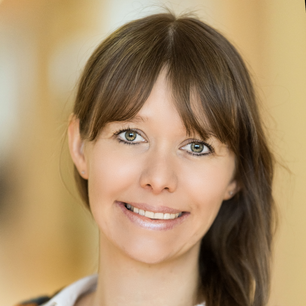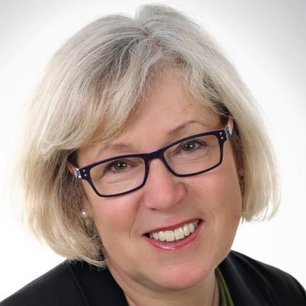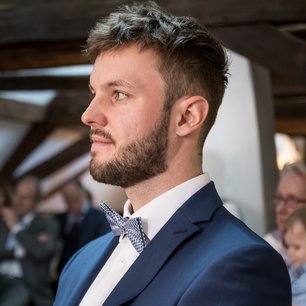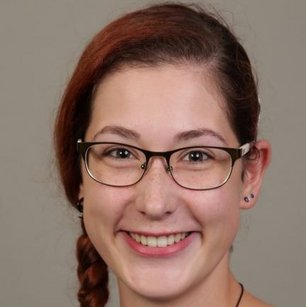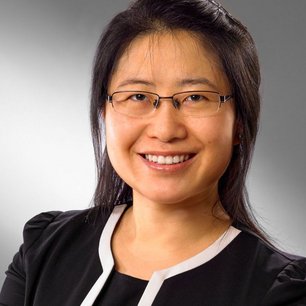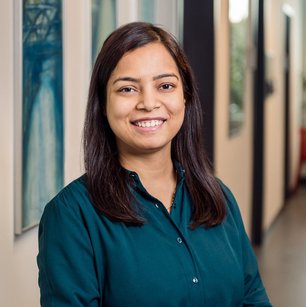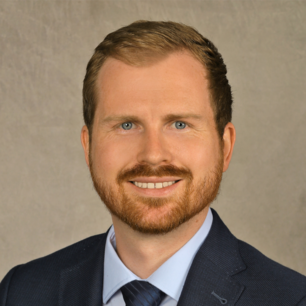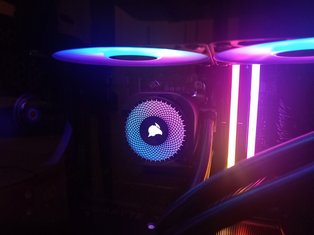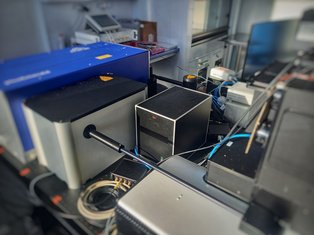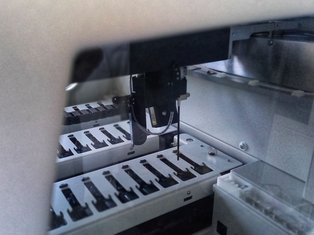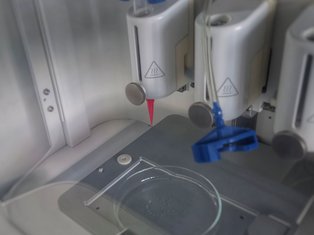Tumor Immunology and Tumor Immunotherapy Division
Prof. Dr. Niels Halama
Integrating broad aspects of immunological parameters for the successful development and optimization of therapeutic approaches in clinical translation
OUR RESEARCH
Why it matters
Cancer immunotherapy has revolutionized oncology. As a standard of care for some cancer entities, broad application in the treatment of patients with hematologic and solid tumors has become a reality. Identification of patients for a specific immunomodulatory approach, identification of successful combinatorial immunotherapy (or combination with chemotherapy, radiation or other intervention) are all important next steps to be developed. Utilizing new model systems and informative trial designs, the connection of basic research and translational efforts make this area highly diverse and challenging, but show the potential for a future of personalized therapy in oncology.
HALAMA LAB
Lab focus
Cancer immunology has moved from scientific insight into practice changing standards in oncology. Robust scientific evidence has provided the entry to successful clinical translation.
The division of Tumor Immunology and Tumor Immunotherapy is integrating broad aspects of immunological parameters (i.e. tissue-specific regulation, microbiome, metabolic regulation, genomic factors etc.) for the successful development and optimization of therapeutic approaches in clinical translation.
An important part is to better understand the regulation of immune responses within tissues of solid tumors. Dedicated biomarker research for the identification of relevant immune cell phenotypes is also a decisive factor like understanding the cytokine regulatory network in specific disease situations. Deeper insights into the situation in human patients are provided by our fully-human preclinical Explant Model System, which is able to recapitulate the microenvironment of individual patients.
In addition, new computational model systems, databases and machine learning (“artificial intelligence”) allow to further elaborate our understanding of the regulation of immune responses. Especially our explant model systems open new possibilities in development of new therapies. Newly developed therapies have been successfully translated into the clinic and combinatorial immunomodulation based on adaptive clinical trial protocols with biomarker driven selection programs are now being implemented.
Head of Division Tumor Immunology and Tumor Immunotherapy
Prof. Dr. Niels Halama
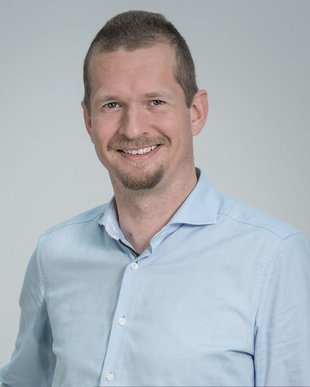 J.Arlt
J.Arlt
[since 2024] Member of the Extended Management Board of the Comprehensive Cancer Center UCT at UMC Department of Hematology, Oncology and Pulmonology (Med 3)
[since 2023] Head of Division, HI-TRON Mainz
[2019- 2023] Head of the Department of Translational Immunotherapy, DKFZ
[2015 – 2019] Group leader, University of Heidelberg, NCT
[2008- 2023] Scientist at NCT; TIGA; DKFZ
[2005 – 2006] Resident and Fellow, NCT
[1999 - 2005] Student at University of Heidelberg
[2012] Best Poster Award AACR (unter mehr als 10.000 Postern von den Gutachtern bestens bewertet)
[2012] Forschungspreis der Dr. Feldbausch Stiftung
[2009] Scientific Excellence Certificate & Best Poster Award, International Cancer Microenvironment Society (ICMS)
[2007] Young Investigator Award, Medizinische Fakultät der Universität Heidelberg
[1998] Stipendium der "Studienstiftung des deutschen Volkes"
[2012 - present] Deutsche Gesellschaft für Immunologie (DGfI)
[2009-present] American Association for Cancer Research (AACR), USA (AACR-sponsored membership), member of the Cancer Immunology Working Group (CIMM)
[2011 - heute] International Society for Translational Medicine
[2009 - 2012] National Society for Histotechnology (NSH), USA
[2007 - heut] International Cancer Microenvironment Society (ICMS)
[2003 - 2006] Editor and Author, Section "Endocrinology” and “Neurology", for Medicle (www.medicle.org)
HI-TRON Mainz DKFZ
AG Halama
Obere Zahlbacherstr. 63 - Building 911
55131 Mainz
Marion Drechsel
Office Manager
06131 9066109
Team
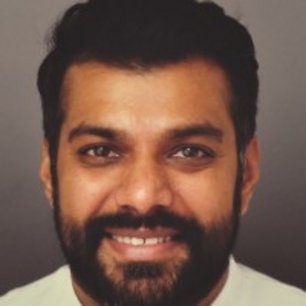 privat
privat
Azaz Ahmed
Scientist
Dr. Anna Berthel
Scientist
 private
private
Stella Bianchi
Student
Marion Drechsel
Office Manager
Dr. Silke Grauling-Halama
Scientist
Alicia Höflich
Technician
Dr. Xu Holtkotte
Scientist
Alexandra Pöchmann
PhD Student
Ulrike Prüfer
Technician
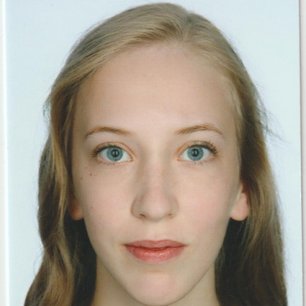 private
private
Elena Rießle Fernandez-Tenllado
Student
Dr. Sakshi Singh
Bioinformatician
Dr. Heiko Weyd
Postdoc
Jana Wolf
Technician
Dr. Xin-Wen Zhang
Scientist
Selected publications
- Ahmed A, Springfeld C, Halama N. De novo induction of tertiary lymphoid structures: an immunotherapeutic strategy in pancreatic cancer. Signal Transduction and Targeted Therapy. 2025; 10; 173.
- Wankhede D, Yuan T, Kloor M, Halama N, Brenner H, Hoffmeister M. Clinical significance of combined tumour-infiltrating lymphocytes and microsatellite instability status in colorectal cancer: a systematic review and network meta-analysis. The Lancet Gastroenterology & Hepatology. 2024; 9(7): 609-619
- Jahangir CA, Page DB, Broeckx G, Halama N et al. Image-based multiplex immune profiling of cancer tissues: translational implications. A report of the International Immuno-oncology Biomarker Working Group on Breast Cancer. The Journal of Pathology. 2024; 262(3): 271–288
- Hamid R, Alaziz M, Mahal A S, Ashton A W, Halama N, Jaeger D, Jiao X, Pestell R G. The Role and Therapeutic Targeting of CCR5 in Breast Cancer. Cells. 2023; 12(18): 2237
- Page D B, Broeckx G, Jahangir C A, Halama N, et al. Spatial analyses of immune cell infiltration in cancer: current methods and future directions. A report of the International Immuno-Oncology Biomarker Working Group on Breast Cancer. The journal of pathology. 2023; 260(5): 514-532
- Thagaard J, Broeckx G, Page D B, Halama N, et al. Pitfalls in machine learning-based assessment of tumor-infiltrating lymphocytes in breast cancer: a report of the international immuno-oncology biomarker working group.The journal of pathology. 2023; 260(5): 498-513
- Ahmed A, Köhler S, Klotz R, Giese N, Hackert, T, Springfeld C, Jäger D, Halama N. Sex Differences in the Systemic and Local Immune Response of Pancreatic Cancer Patients. Cancers. 2023; 15(6):1815
- Probst P, Merz D C, Joos M C, Ahmed A, Feisst M, Klotz R, Halama N, et al. The EVIglance randomized clinical trial: a new standard for answering a clinical question. The British journal of surgery. 2323; 110(4): 515-517
- Denkinger C M, Janssen M, Schäkel U, Halama N, et al. Anti-SARS-CoV-2 antibody-containing plasma improves outcome in patients with hematologic or solid cancer and severe COVID-19: a randomized clinical trial. Nature cancer. 2023; 4(1): 96-107
- Halama N, Zoernig I, Berthel A, Kahlert C, Klupp F, Suarez-Carmona M, Suetterlin T, Brand K, Krauss J, Lasitschka F, Lerchl T, Luckner-Minden C, Ulrich A, Koch M, Weitz J, Schneider M, Buechler MW, Zitvogel L, Herrmann T, Benner A, Kunz C, Luecke S, Springfeld C, Grabe N, Falk CS, Jaeger D. Tumoral Immune Cell Exploitation in Colorectal Cancer Metastases Can Be Targeted Effectively by Anti-CCR5 Therapy in Cancer Patients. Cancer Cell. 2016; 29(4): 587-601
Lab News
11/2025: Congratulations to Rebecca Rothenheber, our former lab member, on successfully completing and defending her MD thesis! We are proud of your excellent work.
10/2025: A new member joins the Halama lab: Sakshi Singh.
09/2025: Immunotherapy must overcome many hurdles to be effective in patients. An overview of these hurdles can be found here (article in German).
05/2025: New Publication: Ahmed A, Springfeld C, Halama N. De novo induction of tertiary lymphoid structures: an immunotherapeutic strategy in pancreatic cancer. Signal Transduction and Targeted Therapy. 2025; 10; 173.
10/2024: Together with the mRNA Cancer Immunotherapies Division Team, the Lab just obtained project funding within the highly competitive DKTK Joint Funding Call "INNOVATION 2024" on the topic of "mRNA-Based Strategies for Targeted TME Modulation and Enhanced Antitumor Immunity". They will soon start working with colleagues from Essen/Düsseldorf, Frankfurt/Mainz and Heidelberg on this project.
05/2024: A new member joins the Halama lab: Florian Heininger.
12/2023: Start of the new division at HI-TRON Mainz.

